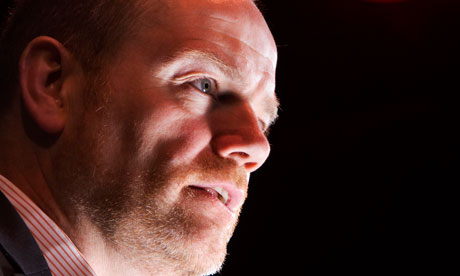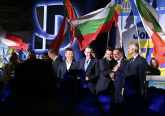
This week, Mark Thompson, former Director General of the BBC, gave a series of three lectures as part of his Humanitas Visiting Professorship in Rhetoric and the Art of Public Persuasion, in honour of Philip Gould. These lectures were all centred around the theme of how the language and tone of public debate has changed in recent years in ways that have been detrimental to the cause of public understanding and has created a ‘cloud of unknowing’ within the wider public regarding matters of civic policy.
In the first lecture, Thompson began by evaluating the claim that Plato had now won the argument and that the misinformed public dialogue of contemporary western nations was beginning to threaten their democratic foundations. Drawing upon evidence from the debates over healthcare reform in both the U.S. and the U.K., where Palin’s propagation of the idea of death panels and Labour’s insistence that Gove’s reforms constituted privatisation “pure and simple” served only to confuse and scare the wider public, Thompson argued that misleading and emotive language is making political reform and compromise harder to achieve. As such, Thompson postulated Plato’s warning that democracy frequently leads to tyranny of the majority, where ill-informed populations hamstring the political system, now seems increasingly prescient:
“Our public language is entering a decadent phase – less able to explain, less able to engage except in the purely political, more prone to exaggeration and paranoia. The risk is that a public language and a set of institutions which were once a source of competitive advantage, as well as a guarantee of freedom – the language of democracy – may now falter”
In the second lecture, Thompson analysed the current state of the ‘argument from authority’ within the public discourse. Using the example of the current debate surrounding anthropomorphic climate change, Thompson sought to evaluate the argument from authority through a single prism, the way in which science is handled in argumentation about public policy. In this lecture he lamented the manner in which science is treated as merely one of the factors to be considered within a debate, weighted equally with other unscientific viewpoints when, given that science gives us our most secure understanding of the physical world, it should really occupy a position of primacy within public debate.
Thompson expanded upon two main causes of this disrespect for science within the public sphere, both centred within the “cloud of unknowing”. The first is that prejudice continues to colour the public’s receptiveness to science: Science’s nature as a field of dispute and evolution makes it easy for many within the wider public to disregard its conclusions when they do not sit well with their own personal convictions.
The second is that public debates about science represent a messy clash between two, not just different, but diametrically opposed approaches to argument: scientific argument and advocacy. Many within science, in an effort to counter the neglect of scientific argument within contemporary policy debates, have departed from previous commitments to scientific argument and have instead begun to engage in advocacy. An example of this are those scientists convinced of the existence of anthropomorphic climate change who wish to silence dissenting voices whose opinions they fear might be used as an excuse for politicians unwilling to act on environmental issues. While their motives may be noble, however, the foraying of scientists into more polemic debate has served only to add to the confusion of how the “argument from authority” should be received in the public sphere.
In the third lecture, Thompson analysed how the perceived necessity for policy makers to engage in moral argument for their cause also contributes to public confusion and mistrust. In this instance, Thompson utilised the prism of public figures making the case for war and how pressure acting upon them to make the moral case as well as the pragmatic case for war has led to a warping of the debate over foreign policy. For example, many politicians demonstrate a need to engage in ‘moral top-up’ of war aims, such adding democracy, girls education and economic development to the list of aims for the war in Afghanistan several years into the conflict, in order to retain the support of an increasingly war weary public for what is, in essence, a strategic, not a moral, policy.
This pressure is compounded by the historical circumstance which has meant that so much of the modern rhetoric of war in the UK relies on a set of archetypal paradigms, predominantly those of the “good war” of World War Two and the “useless waste” of World War One. As such, politicians all too frequently play into this public analysis by characterising their own wars in the language of the “good war” and the foreign excursions of their opponents in the language of the “useless waste” of World War One. This has entailed that the strategic and moral complexity of contemporary wars and interventions is simplified by politicians into tales of good and evil. This has come at the expense of public understanding and, in the end, has led to public mistrust.
As a trio, the lectures raise a number of serious concerns over the direction of current public debate and over the degeneration of political language. They do not argue, however, that Plato has simply won the argument; democracy remains too valuable a commodity to be dismissed so easily. Rather, according to Thompson, what is needed is to “purify the dialect of the tribe” through a “new and different kind of education in civics”. Fundamentally, the citizens of the democratic world must be taught rhetoric again. In addition, the media and politicians must also begin to talk in a new language, one of compromise, concession and in the pursuit of public understanding, if we are to escape the cloud of unknowing.
At 5pm tonight, at St Peter’s College Chapel, Thompson will be joined by Polly Toynbee, David Willetts MP, Lord O’Donnell and Andrew Marr for a roundtable discussion on the subject of “Politics and Language: Friends or Enemies?” On the basis of the previous events this week, your correspondent feels confident in recommending what promises to be a very interesting event.








4 Comments
How can a master of the humanities be unaware of the historical meaning of “The Cloud of Unknowing” (with a quite entirely different notion about how to defeat misleading preconceptions)? See http://en.wikipedia.org/wiki/Cloud_of_Unknowing .
If you had attended the speech you would have realised that he was not in fact unaware of this original usage. The exact text of the speech concerning this issue read:
“It is the language of partisanship, character, intentionality, values and of solidarity with one’s own side. It is sometimes – as the death panel is – the language of the conspiracy theory. It is never the language of explanation. The result is what I have called – shamelessly stealing and subverting the title of a work of mediaeval English mysticism – the cloud of unknowing”.
For obvious issues of space, this was not mentioned in the original post.
How can a master of the humanities be unaware of the historical meaning of “The Cloud of Unknowing” (with a quite entirely different notion about how to defeat misleading preconceptions)? See http://en.wikipedia.org/wiki/Cloud_of_Unknowing .